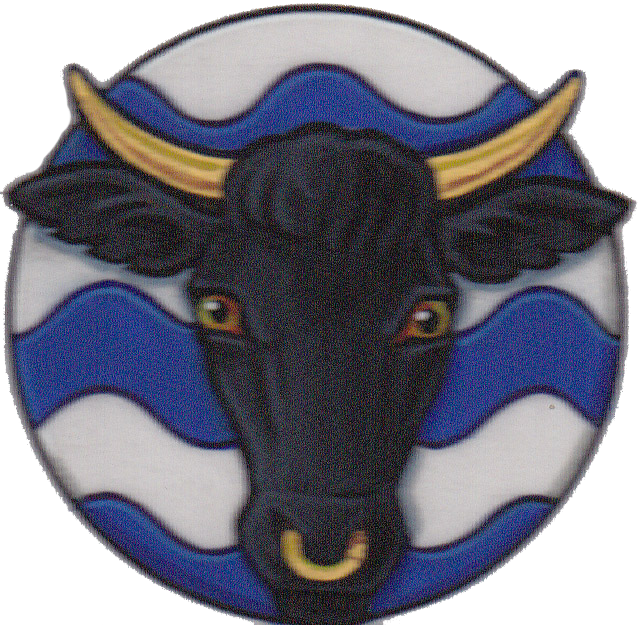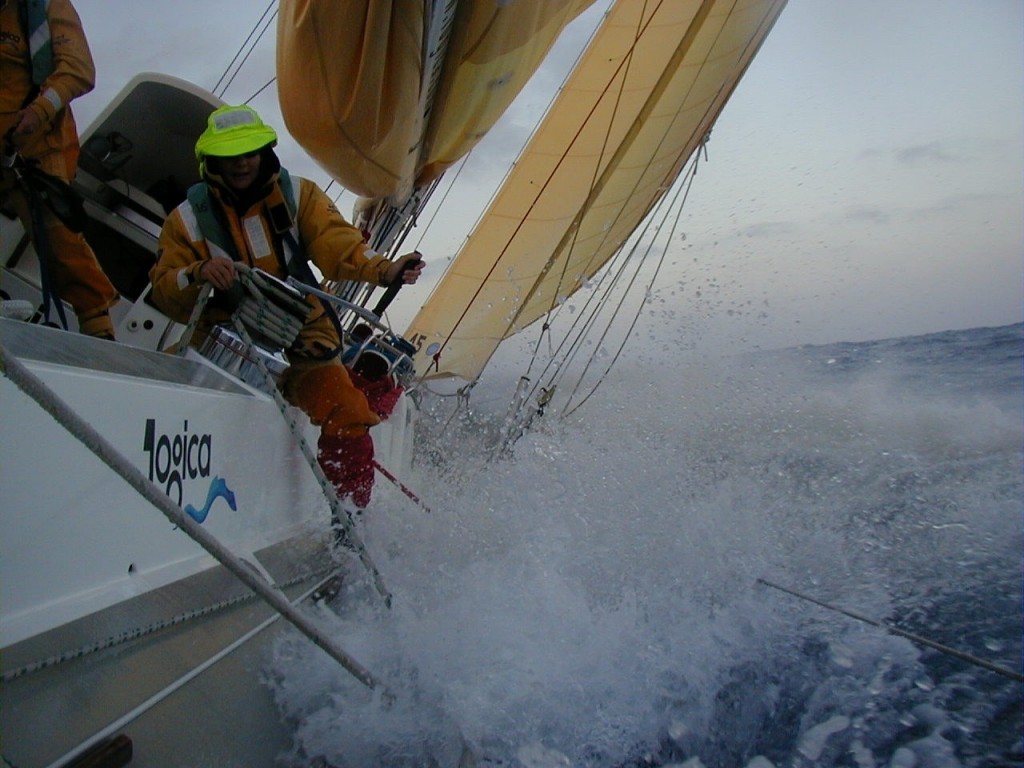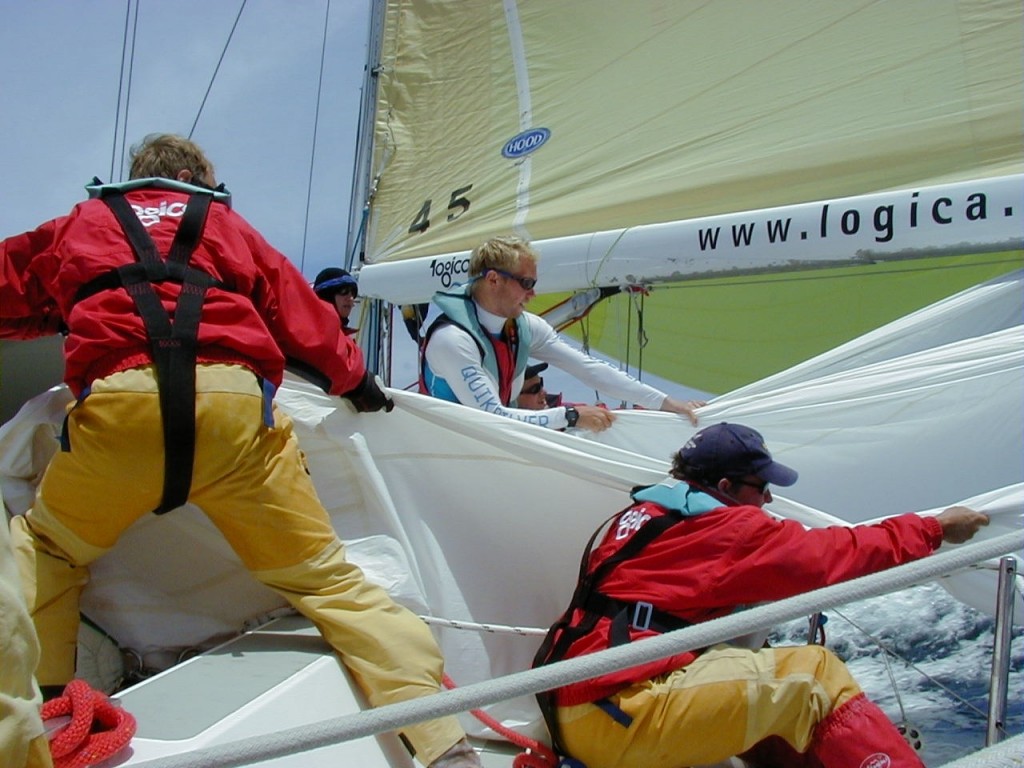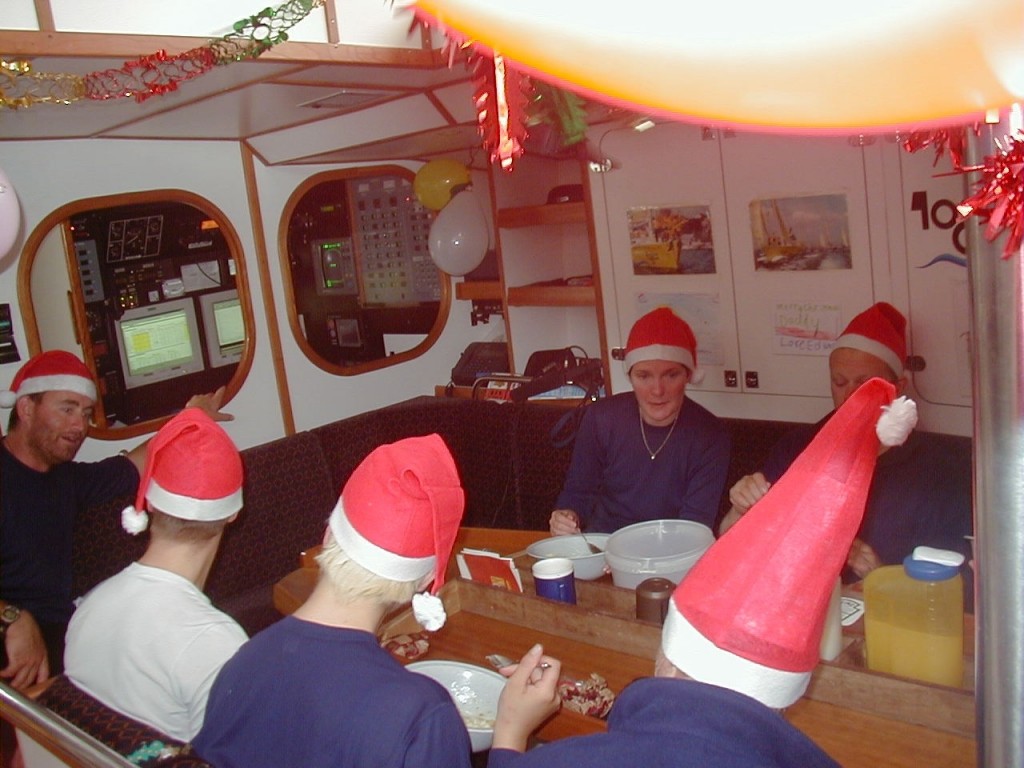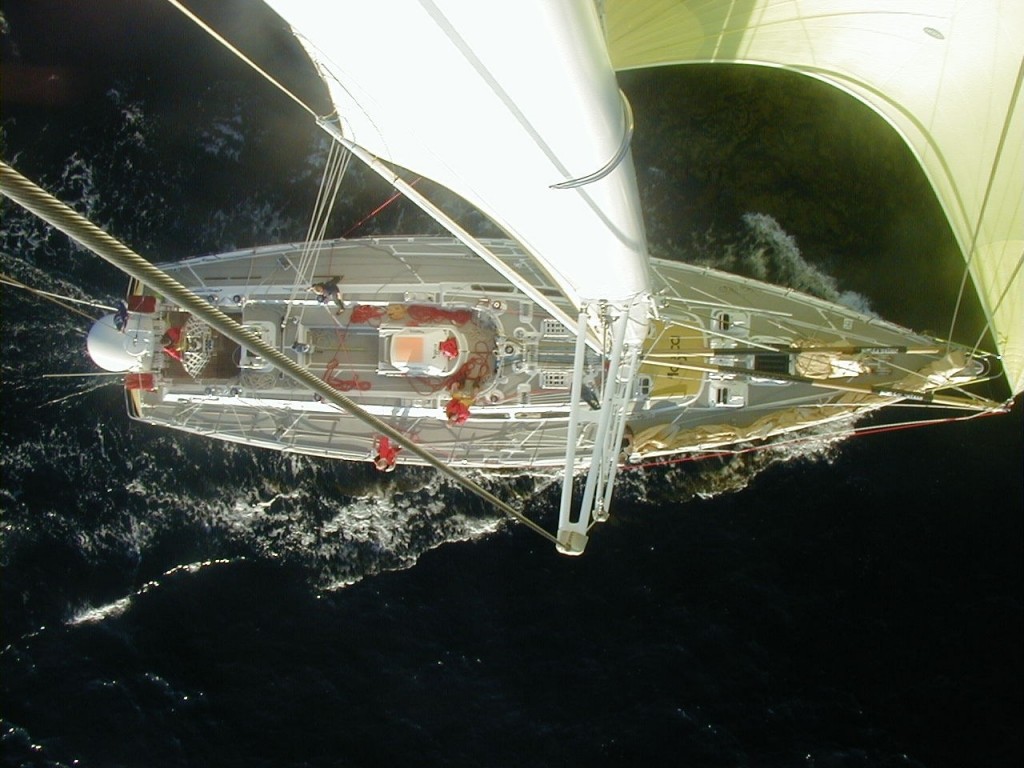 11 years ago this month, I stepped aboard a 72-foot racing cutter affectionately called The Good Ship Logica and began a 10-month round the world yacht race, the only one to go around the world against the currents and prevailing winds. Below deck, I was the geek, making sure the satellite could broadcast despite 90ft waves blocking line of sight; above deck I was the Bowman, standing at the pointy end and getting the shit kicked out of me by walls of water as our team struggled to take down huge sails that the wind wanted to keep up.
11 years ago this month, I stepped aboard a 72-foot racing cutter affectionately called The Good Ship Logica and began a 10-month round the world yacht race, the only one to go around the world against the currents and prevailing winds. Below deck, I was the geek, making sure the satellite could broadcast despite 90ft waves blocking line of sight; above deck I was the Bowman, standing at the pointy end and getting the shit kicked out of me by walls of water as our team struggled to take down huge sails that the wind wanted to keep up.
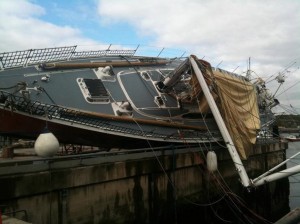 Today I learned that someone mishandled a crane in Portsmouth during a routine maneuver and dropped Logica, effectively killing it. This was the boat that I learned to trust to keep me safe through hurricanes, lightning strikes and the worst the Southern Ocean had to offer. It was the boat that I cursed every time a rampant wave picked me up and tossed me down the deck like a rag doll, slamming me into rigging and stanchions. It was the boat in whose bowels I spent cold hours pumping water into buckets after the electric pump failed, the boat that taught me how to sleep on a rollercoaster while a generator roared next to my head, the boat I loved, heart and soul. Now she’s gone.
Today I learned that someone mishandled a crane in Portsmouth during a routine maneuver and dropped Logica, effectively killing it. This was the boat that I learned to trust to keep me safe through hurricanes, lightning strikes and the worst the Southern Ocean had to offer. It was the boat that I cursed every time a rampant wave picked me up and tossed me down the deck like a rag doll, slamming me into rigging and stanchions. It was the boat in whose bowels I spent cold hours pumping water into buckets after the electric pump failed, the boat that taught me how to sleep on a rollercoaster while a generator roared next to my head, the boat I loved, heart and soul. Now she’s gone.
So today I’ve been thinking about the lessons she taught me.
The opposite of fear is not bravery, it’s initiative
When my first hurricane at sea hit, it came out of nowhere. I was delivering a boat (the older, smaller sister of Logica) across the Atlantic from Plymouth to Boston. The boom swung across the deck with such ferocity that it ripped the pulley system that controlled it out of the deck and flung it out to sea; the third wave took the heavily bolted down compass and consigned that to the ocean. Our skipper was up on deck so fast it seemed incredible that he had just been asleep and, screaming above the waves, he got us working to try to bring down the mainsail and control the wayward boom. Our boat was so far over on its side that the mast was dipping into the ocean and water was starting to drag the mainsail and the boat further down into the lifeless grey. I don’t remember being frightened, at least not in the way I had always thought about fear; traditional fear involves some prediction of a future you would rather avoid. At this point, I couldn’t begin to think about a future at all. I just remember feeling utterly drained of initiative. I would do whatever anyone asked me to do, but I was utterly unable to think or to act for myself.
I brooded over that night for months afterwards, dwelling on my own inadequate response when faced with a true crisis. I knew I was due to set out on a round-the-world yacht race the next year and was terrified that I didn’t have what it takes, that I would let down my team when it mattered most.
In October 2000, my skipper came below decks and asked us if we had ever seen the Perfect Storm (It had occurred on the Grand Banks near our position at the time). “Yeah, three storms converging on the Flemish Cap” replied Adam, the bowman on the other watch. “We’re in luck” the skipper replied, “we’ve only got two storms converging on us”. We watched the scarlet dawn rising and remarked upon the sailors motto “red sky at night, sailor’s delight; red sky at morning, we’re fucked”.
We had more warning this time, but the hurricane still hit with a vengeance. There’s something about the sea when the wind gets above 70 knots of breeze (80mph), it becomes gunmetal grey, as if not even colour could live in these conditions. Our bow team struggled up to the foredeck to take down the headsails and put up our storm staysail. Orange and bulletproof, we needed it up if we were going to be able to steer a course through this storm at all. This was the moment I had thought about for years, but for some reason I was not the same man who had been so useless on that previous voyage. I was able to think, to act on my own initiative and help my team to survive. It was a revelation and gave me hope that the ability to lead in a crisis was not inbuilt from birth but could be learned, that I could become better. The lesson I took from this is that bravery is a term applied retroactively, after the work has been done and the danger has passed. In a situation that engenders fear and terror, don’t ask yourself to be brave; simply ask yourself to act. The bravery comes later.
Finding fault is a luxury best saved for tomorrow
My first day of training on the yacht and I’d already managed to break something. A sail was tumbling down and the boat was losing speed. The first mate darted across the boat to find out what had happened and I started in on a long and rambling tale of the series of unfortunate events which had, through no fault of my own, caused the damage we were looking at right now. I was barely three sentences in, when the mate interrupted me: “I don’t give a crap whose fault it was, I just need to know what to fix”.
 The words hit me like a sledgehammer, my concern had been with my perceived reputation and standing as a competent crewman, his concern was simply that the boat wasn’t working right and yet it needed to be. Identifying the incompetent culprit responsible or working out the precise series of events leading us to here were luxuries that could wait for another time because right now the boat needed to be fixed before we lost too much speed and time. If I was ever going to truly pull my weight with the crew, I would have to learn to be ok with people potentially thinking the worst of me or ascribing failures to me that were not directly my own fault, what mattered was keeping the boat moving. I find thinking of that day instructive when facing a board meeting, finding fault or assigning blame is an idle luxury, what matters is keeping the company moving.
The words hit me like a sledgehammer, my concern had been with my perceived reputation and standing as a competent crewman, his concern was simply that the boat wasn’t working right and yet it needed to be. Identifying the incompetent culprit responsible or working out the precise series of events leading us to here were luxuries that could wait for another time because right now the boat needed to be fixed before we lost too much speed and time. If I was ever going to truly pull my weight with the crew, I would have to learn to be ok with people potentially thinking the worst of me or ascribing failures to me that were not directly my own fault, what mattered was keeping the boat moving. I find thinking of that day instructive when facing a board meeting, finding fault or assigning blame is an idle luxury, what matters is keeping the company moving.
Do your thinking before the crisis
We were deep in the Southern Ocean, one of the nastiest environments on earth and three of us were sitting on the windward side of the deck (the high side) with little to do but endure the waves crashing over us and make sure the helmsman didn’t get hurt. Our skipper came up on deck to take a look around and spotted a trailing rope on the leeward side that he wanted to tidy. He made his way down to where the deck was skimming the water and began to bring in the rope when a rogue wave took him by surprise and knocked him down the deck. All three of us leaped forward to grab him before he was washed overboard, but two of us were stopped short by our safety lines like a dog reaching the limits of its leash.
Only Glyn, had the presence of mind to first unhook his safety line get across to the other side, reattach and reach our skipper before it was too late. While I and my team-mate had been sitting there grumpily bearing the waves and wishing we were elsewhere, Glyn had been running through scenarios in his head and working out potential plans of action should any of them occur. He knew that there isn’t necessarily time in a crisis to stop, assess the best course of action and then enact it, so you have to do your thinking beforehand. Be constantly working through “what if?” scenarios so that your brain has the advantage when an accident happens and you are not left flailing helplessly at the end of a line watching someone get washed away.
Leave it on the Last Wave
Our round the world yacht race involved putting 18 people in a tin can, plunging it in salt water and shaking it violently for 10 months. People hallucinate through lack of sleep, the unconscious tapping of teeth can provoke a knife fight (which occurred on another yacht in a previous race) and one simply can’t avoid someone if you have an argument. The only way for your team to mentally survive in that kind of environment is to embody the motto of “Leave it on the last wave”. The argument you had during a sail change? That happened on a wave way in the distant, leave it out there where it belongs. The time you almost came to blows with a team mate over something so minor you both can’t remember, leave it on the wave where it started because the wind has changed and there are new sails to be put up and a new course to take advantage of. The lesson on a boat is clear, you can either let go of slights or negative emotions or you can damn near kill someone. There’s not much wiggle room in between.
These are some of the gifts that Logica gave me, my friends have often remarked upon how the person who joined the race in September 2000 was utterly different from the man who left it in July of 2001. I miss my boat, I miss my team and I will always treasure what I learned on her deck.
[youtube]http://www.youtube.com/watch?v=zXuzy0k9mZQ[/youtube]
